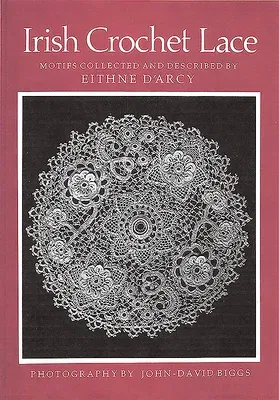Of all forms of crochet lace, that known as 'Irish Crochet' is most
sought after and is probably the best known. While the Irish tradition
for producing this work dates back to the sixteenth century, when it was
known as 'nuns work' from the fact that the technique and style was
developed in Irish convent communities in imitation of continental
lacemaking styles, the manufacture of crochet lace did not become a
cottage industry in Ireland until the middle of the nineteenth century,
after the devastation caused by the Great Famine of the 1840s, when the
development of home crafts was encouraged to create some small income
for otherwise destitute families. Eithne D'Arcy, who died in 1999, came
from a family who were buying agents for Irish crochet lace in the area
around Clones in County Monaghan. This area was one of the principal
centers of the Irish lace industry. A lifelong involvement with the
Irish lacemakers inspired Mrs D'Arcy to record her knowledge and to
describe the traditional motifs and patterns which were gradually being
lost as the old lace makers died out. Irish Crochet Lace is both a
pictorial record of one of Ireland's finest crafts and a practical
manual that sets out in order the steps in construction of a wide range
of traditional motifs which can be built up into unique and beautiful
designs. John-David Biggs has taken a series of superb photographs which
capture each step in the lacemaker's craft and the construction of each
motif.

